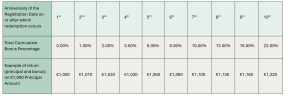Positively
Registered User
- Messages
- 16
My son is to recieve an inheritance of about €70,000 and I'm hoping to get some advice on the best place to invest it for him. He will not need to access the funds for at least 5 - 10 years so its okay if it will be locked away for that time.
I hope this is the right forum for this, apologies if not.
Thank you.
I hope this is the right forum for this, apologies if not.
Thank you.
